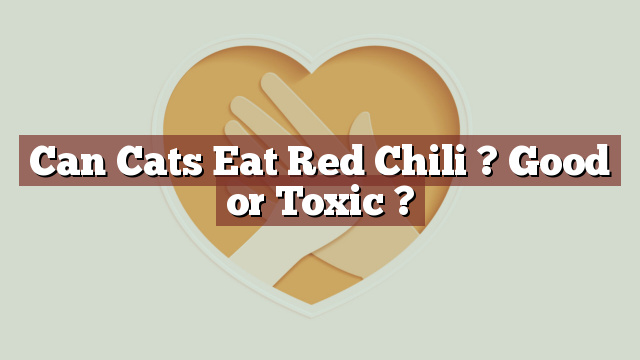Can Cats Eat Red Chili? Safe or Toxic?
Cats are known for their curious nature and their tendency to explore different types of food. As responsible pet owners, it is crucial to be aware of what is safe for our feline friends to consume. One common question that arises is whether cats can eat red chili. In this article, we will delve into the nutritional value of red chili, discuss whether it is safe or toxic for cats, explore the potential risks or benefits, and provide guidance on what to do if your cat consumes red chili.
Nutritional Value of Red Chili
Red chili, also known as chili pepper, is a popular spice used in various cuisines around the world. It adds a distinct flavor and spice to dishes, making them more enjoyable for many of us. From a nutritional perspective, red chili contains vitamins A, C, and E, as well as minerals such as potassium and iron. Additionally, it is rich in antioxidants that may have potential health benefits for humans.
Can Cats Eat Red Chili? Safe or Toxic?
No, cats should not eat red chili. Although humans can tolerate the spiciness of chili peppers, cats have a different digestive system that makes them more sensitive to certain foods. Red chili contains a compound called capsaicin, which is responsible for its spiciness. Capsaicin can cause gastrointestinal distress in cats, leading to symptoms such as vomiting, diarrhea, and abdominal pain.
Moreover, capsaicin can irritate a cat’s mouth and throat, causing discomfort and potential damage to their delicate tissues. In severe cases, it may even lead to difficulty breathing. Therefore, it is best to avoid feeding red chili to cats to prevent any unnecessary health complications.
Potential Risks or Benefits of Red Chili for Cats
As mentioned earlier, the consumption of red chili can cause digestive issues and mouth discomfort in cats. These risks outweigh any potential benefits that may be associated with the nutritional content of red chili. While humans can benefit from the antioxidants and vitamins found in red chili, cats have different dietary requirements and are not able to fully utilize these nutrients. Therefore, it is advisable to provide our feline companions with a balanced diet that meets their specific nutritional needs.
What to Do if Your Cat Eats Red Chili
If your cat accidentally consumes red chili, it is important to take prompt action. Monitor your cat closely for any adverse reactions or symptoms such as vomiting, diarrhea, or difficulty breathing. If you notice any concerning signs, it is crucial to seek veterinary assistance immediately. The veterinarian will be able to provide appropriate guidance and treatment to alleviate any discomfort your cat may be experiencing.
Conclusion: Red Chili – A Risky Choice for Cats
In conclusion, red chili is not a suitable food for cats. While humans may enjoy the spiciness and nutritional benefits of red chili, it can be harmful to cats due to the presence of capsaicin. Cats have a different digestive system and are more sensitive to certain foods. It is essential to prioritize their well-being by providing them with a balanced diet that fulfills their specific nutritional requirements. If your cat accidentally consumes red chili, it is important to monitor their condition closely and seek veterinary assistance if necessary. By being mindful of what our cats eat, we can ensure their continued health and happiness.
Thank you for investing your time in exploring [page_title] on Can-Eat.org. Our goal is to provide readers like you with thorough and reliable information about various dietary topics. Each article, including [page_title], stems from diligent research and a passion for understanding the nuances of our food choices. We believe that knowledge is a vital step towards making informed and healthy decisions. However, while "[page_title]" sheds light on its specific topic, it's crucial to remember that everyone's body reacts differently to foods and dietary changes. What might be beneficial for one person could have different effects on another. Before you consider integrating suggestions or insights from "[page_title]" into your diet, it's always wise to consult with a nutritionist or healthcare professional. Their specialized knowledge ensures that you're making choices best suited to your individual health needs. As you navigate [page_title], be mindful of potential allergies, intolerances, or unique dietary requirements you may have. No singular article can capture the vast diversity of human health, and individualized guidance is invaluable. The content provided in [page_title] serves as a general guide. It is not, by any means, a substitute for personalized medical or nutritional advice. Your health should always be the top priority, and professional guidance is the best path forward. In your journey towards a balanced and nutritious lifestyle, we hope that [page_title] serves as a helpful stepping stone. Remember, informed decisions lead to healthier outcomes. Thank you for trusting Can-Eat.org. Continue exploring, learning, and prioritizing your health. Cheers to a well-informed and healthier future!

